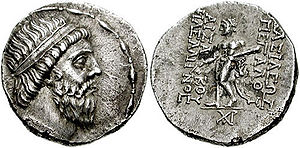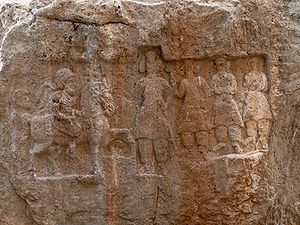- Mithridates I of Parthia
-
For other people named Mithridates, see Mithridates (disambiguation).
 Coin of Mithridates I from the mint at Seleucia on the Tigris. The reverse shows Heracles holding a cup, lion's skin and club. The Ancient Greek inscription reads ΒΑΣΙΛΕΩΣ ΜΕΓΑΛΟΥ ΑΡΣΑΚΟΥ ΦΙΛΕΛΛΗΝΟΣ, basileōs megalou arsakou philellēnos ([coin] of the Great King Arsaces, friend of the Greeks). The date ΓΟΡ is the year 173 of the Seleucid era, corresponding to 140–139 BC.
Coin of Mithridates I from the mint at Seleucia on the Tigris. The reverse shows Heracles holding a cup, lion's skin and club. The Ancient Greek inscription reads ΒΑΣΙΛΕΩΣ ΜΕΓΑΛΟΥ ΑΡΣΑΚΟΥ ΦΙΛΕΛΛΗΝΟΣ, basileōs megalou arsakou philellēnos ([coin] of the Great King Arsaces, friend of the Greeks). The date ΓΟΡ is the year 173 of the Seleucid era, corresponding to 140–139 BC.
Mithridates or Mithradates I (Ancient Greek: Μιθριδάτης or Μιθραδάτης, Persian: مهرداد Mehrdād) (ca. 195 BC? - 138 BC) was the "Great King" of Parthia from ca. 171 BC - 138 BC, succeeding his brother Phraates I. His father was King Phriapatius of Parthia, who died ca. 176 BC). Mithridates I made Parthia into a major political power by expanding the empire to the east, south, and west. During his reign the Parthians took Herat (in 167 BC), Babylonia (in 144 BC), Media (in 141 BC) and Persia (in 139 BC).
Mithridates first expanded Parthia's control eastward by defeating King Eucratides of the Greco-Bactrian Kingdom. This gave Parthia control over Bactria's territory west of the Arius river, the regions of Margiana and Aria (including the city of Herat in 167 BC).
- "The satrapy Turiva and that of Aspionus were taken away from Eucratides by the Parthians." (Strabo XI.11.2[1])
These victories gave Parthia control of the overland trade routes between east and west (the Silk Road and the Persian Royal Road). This control of trade became the foundation of Parthia's wealth and power and was jealously guarded by the Arsacids, who attempted to maintain direct control over the lands through which the major trade routes passed.
In Persia in 139 BC, Mithridates I captured the Seleucid King Demetrius II, and held him captive for 10 years while consolidating his conquests. Demetrius II later married Mithridates I's daughter Rhodogune and had several children with her.
Parthian victories broke the tenuous link with Greeks in the West that had sustained the Hellenistic kingdom of Greco-Bactria, yet Mithridates I actively promoted Hellenism in the areas he controlled and titled himself Philhellene ("friend of the Greeks") on his coins. The coins minted during his reign show the first appearance on Parthian coinage of a Greek-style portrait showing the royal diadem, the standard Greek symbol for kingship. Mithradates I resumed the striking of coins, which had been suspended ever since Arsaces II of Parthia (211–191 BC) had been forced to submit to the Seleucid Antiochus III (223–187 BC) in 206 BC.
His name assigned him to the protection of Mithra and carried the god's authority in some measure.
Mithridates I's son, Phraates (138–128 BC), succeeded him on his death as Great King.
Mithridates I of ParthiaDied: 138 BCPreceded by
Phraates IKing of Parthia
171 – 138 BCSucceeded by
Phraates IIReferences
Categories:- 195 BC births
- 138 BC deaths
- Parthian kings
- 2nd-century BC rulers
Wikimedia Foundation. 2010.

